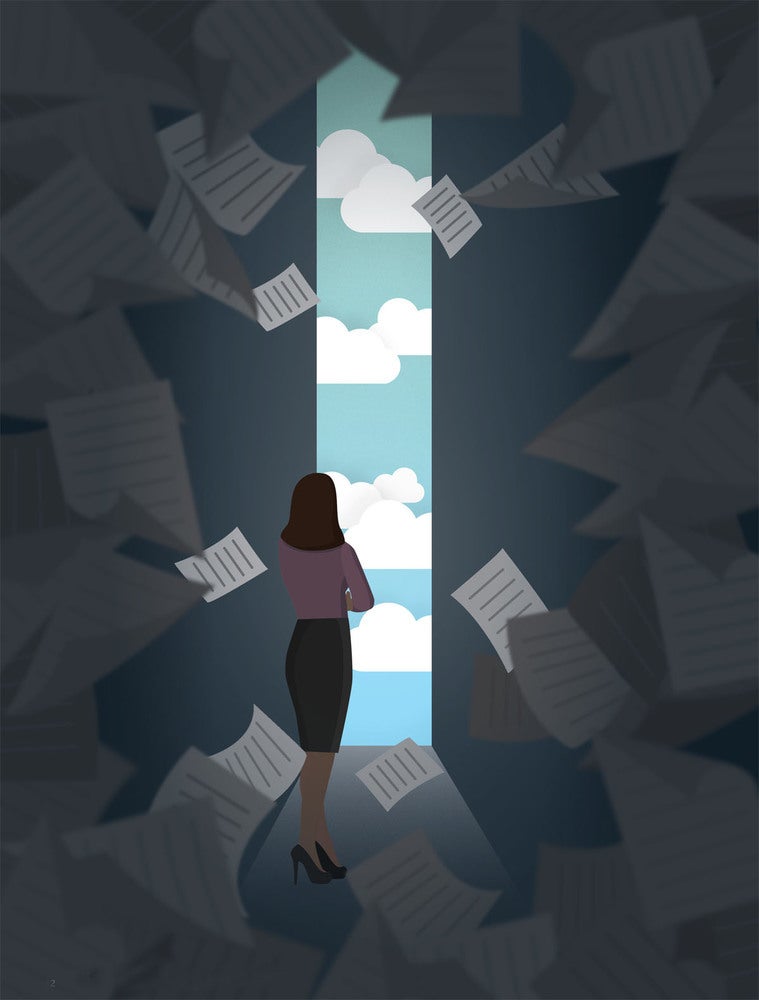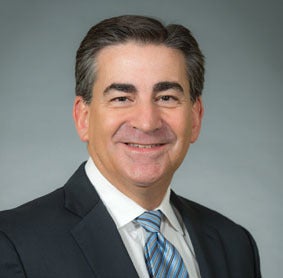
CHEAT SHEET
- Opportunities. While the pandemic has forced some organizations to reduce staff, others are actively hiring and conducting interviews virtually.
- Job hunting. The fundamentals for finding a new position remain nearly the same as before: networking and preparation. Only now this will be done virtually; attend webinars, schedule video calls, and read and share articles from your network.
- Relationship-building. Whether at the start of your search or already in your new position, it’s important to connect with others. Leave your camera on during video conferences and schedule one-on-ones in addition to group calls.
- Remember your value. Focus on your strengths and present them confidently throughout your journey. Be available and helpful to your new team, but don’t forget to take time for your well-being.
Earlier this year, when many of our organizations sent us off to work from home due to social distancing recommendations to fight the deadly spread of the novel coronavirus, many of us had to figure out the new work rules quickly and without a lot of guidance. It was a lot to navigate and I was pleased to see how willing ACC members were to share how they were coping, as well as tips to make it easier for the rest of us. As part of my effort to listen, find practical tips, and share them, I learned how many of us were concerned about what would happen to our jobs. Would there be cutbacks and layoffs? Would we have to retool our skills in significant ways? How were organizations dealing with the emerging financial and personnel challenges, and how were leaders leading during a time of such uncertainty? So many questions, but ACC has always been about finding solutions that will be helpful to you, our members. You tell us — it’s what we do best.
COVID-19 has affected every industry. Whether businesses have been forced to close or severely limit their operations; or have needed additional help to address issues brought on by the pandemic, business for the last several months has been anything but usual. The impact on people has been just as staggering. According to reporting by the World Economic Forum, while unemployment claims have varied globally — in April rising to levels as high as 15 percent in the United States, and by just 2.5 percent in Japan, for example — all economies have been affected. In fact, the UN’s International Labour Organization predicts that the second quarter of 2020 could see some 305 million full-time jobs lost because of COVID-19.
With so many of the challenging stories related to the hardships due to COVID-19, wouldn’t it be inspirational to hear from people who have embarked on new and exciting roles within the legal department — and outside of it?
One thing I noticed during my outreach was that while some organizations were facing tough decisions to reduce staff and implement closures, others were hiring. I noticed, pleasantly, that several of my professional connections were landing great new positions, some in entirely new industries. It got me thinking — with so many of the challenging stories related to the hardships due to COVID-19, wouldn’t it be inspirational to hear from people who have embarked on new and exciting roles within the legal department — and outside it?
I reached out to several of these brave souls to find out what it’s like to start a new role virtually, during a global pandemic. What were their hiring processes like; and how have they shown leadership, made connections, and brought their teams together?
ACC spoke to a few lawyers, including former ACC associate general counsel, Mary Blatch, who recently took on the role of regulatory counsel and data privacy officer at CFA Institute; Ryan Green, whose most recent role is a new take on legal as chief investment and administrator officer with DL3 Realty Advisors, a commercial real estate development and investment advisory firm; and executive vice president and general counsel of Raytheon Technologies, Frank Jimenez.
The interview process
When we go into an organization’s office to interview, there’s an opportunity to take in the culture by observing how the workplace is set up — do people naturally gather and seem connected? What is the overall “vibe”? However, due to COVID-19, interviews have, in many cases, gone virtual. While the interviewees may have missed out on the in-person phase of the interviewing process (many interviews begin over the phone or virtually anyway), it seems that the rest of the process was familiar, except of course when it came to interacting with and meeting (or not meeting) their new bosses.
“I started the process before mandatory work from home began, but the entire process was virtual,” says Blatch. “I had an initial interview with the hiring director via phone due to his travel schedule, but at the time, I assumed we’d be able to meet in person at a later date. Obviously, that never happened so I have never met my boss in person.” Blatch also noted that it is more difficult to get a real sense of culture when going through this process with no in-person contact. “I think the most challenging aspect of a virtual interview process is there is less opportunity to ascertain the culture of a company.”
Green also began his unofficial interview process before the pandemic began and made it his business to start developing a relationship with his new boss as soon as possible. “I began getting to know the firm and building a relationship with the owner and managing principal, Leon Walker. As we got to know each other, we realized that my skillset would address some operational, managerial, leadership, and subject matter expertise the firm needed,” he recalls.
For Jimenez, his selection as general counsel came about following the merger of two equally dynamic and historic companies, Raytheon Company and United Technologies Corporation (which simultaneously spun off its Otis and Carrier businesses as independent, publicly traded companies). According to Jimenez, his boss, CEO Greg Hayes, was focused on choosing a leadership team that balanced equally between legacy UTC and legacy Raytheon executives. “I was the GC of Raytheon for five years before the merger, which closed in April of this year. My counterpart had been the GC at UTC for 13 years and chose to retire in connection with the merger,” he explains. “I feel very fortunate to have been chosen as the GC.”

MARY BLATCH
REGULATORY COUNSEL & DATA PRIVACY OFFICER
CFA INSTITUTE
Connecting from afar — Challenges and opportunities
Relationship building
Starting a new position this way is different, to put it mildly. Building relationships is a fundamental part of starting any new role, so I was curious about how to create the same opportunities and space to grow relationships from home.
While Green’s initial start date was March 30, he consciously made efforts to stay in touch with his new company, attempting to integrate as much as possible before he officially came on board. However, once things began to shift drastically due to the global spread of COVID-19, he decided to forgo his plans to take the month of March off, offering instead to begin early. “I had planned to travel during March, but as the outlook shifted, so did my plans. I started going to evening functions and networking as much as possible. After the state closure to stem the spread of COVID, I offered to start in the new role about a week early, including leading the firm’s pandemic response and attending virtual meetings with the team.” Green felt it was important to demonstrate his value and willingness to devote his time to matters that would be helpful to his new employer and position, even before officially going on payroll. “I really wanted to communicate my excitement for the opportunity and my commitment to starting and thriving — regardless of the pandemic.”
Jimenez is in the unique position of not only beginning a new role during a pandemic but doing so not long after a major merger. “For me, the worst thing about launching the new combined company in the midst of this global pandemic has been the inability to get to know in person my new coworkers from the legacy UTC side of the house,” Jimenez explains. “In the pre-pandemic months leading up to the merger, I was able to meet dozens of them in the course of planning for the merger and selecting my own leadership team. But the Raytheon Technologies Office of General Counsel has over 2,500 members all over the world. Normally, in the first few months, I would have boarded flights to places as far-flung as Charlotte, Cedar Rapids, and Singapore to meet hundreds of my new teammates at Collins Aerospace and Pratt & Whitney (two legacy UTC businesses). I would be holding town halls and other face-to-face group sessions to begin getting to know them and them me.” So, Jimenez had to rely on technology to make those valuable connections.
Technology
With many of us working from our homes, we’ve had to rely on technology not only to get our work done, but to connect. Like the rest of us, Blatch, Jimenez, and Green have had to get to used to video conferencing on a more regular basis, and quickly. For Blatch, video calls proved vital as she came on board at CFA Institute. “In the first two weeks, I had numerous video calls with my primary internal clients and colleagues who support compliance and legal functions at the organization,” she says. “Even though video calls are not my favorite thing to do, I’ve made an effort to always have my camera on so that the teams I support can come to recognize me given that I won’t be meeting them in person in the near future.”
There are, however, perks to getting to know your new team virtually. According to Blatch, she is having a much easier time remembering her new colleagues’ names. “I have found one advantage to meeting everyone over teams calls versus the usual in-person introductions where you walk around the office is that it’s much easier for me to remember people’s names because I am seeing them written by their image during the video call!” This is a very practical plus and encourages each of us to assure that we take time to include our name when signing in for video calls so it’s easier on our colleagues.
Green, who describes himself as very outgoing and able to successfully build relationships in normal situations, says he was concerned about how to navigate doing so virtually. He, like Blatch, has found video conferencing to be an essential tool for his team of 10 to connect and get to know each other. “Video conferencing has been an extremely helpful tool that allows us to engage in nonverbal communication, see facial expression, and build those relationships,” he says.
There are, however, perks to getting to know your new team virtually. According to Blatch, she is having a much easier time remembering her new colleagues’ names [because each face has a name under it during calls].
Like Blatch and Green, Jimenez has had to rely on technology to foster these connections, even across the globe. While he’s been limited to mass introductory conference calls in place of the town halls he’d prefer, he too has been surprised with how far he’s come with video tools like Zoom. “A surprising outcome of this transition has been the superiority of Zoom over phone calls. Four months ago, like most, I didn’t know what Zoom was.” Now, Jimenez is using it to schedule and meet across a broad spectrum of time zones.
More chances to connect on a human level
Understanding that everyone is dealing with this pandemic differently, with no one set of challenges, Green notes the opportunity the pandemic has presented for managers to just “check in” with their teams regularly. “There is a silver lining. The pandemic and the quickly shifting circumstances required empathy, focus, and intentionality that I think actually served to bring us closer together over a shorter amount of time,” he says. “Many times I am reminded that even though I’m the one who started a new job, the entire team is adapting to this new normal and feeling a bit unsettled. That perspective really helps fill the deficit and serves as a bridge for developing relationships and building the trust of the team.”
Jimenez echoes these thoughts, stating that we are living through extraordinary times. “We’ve not seen such widespread disruption to personal and social practices and rhythms in our lifetimes,” he says. “Fear and anxiety often accompany dramatic change. I’ve tried to make it clear to the team that their principal priorities come not from their capacities as employees, but from their status as individuals, family members, and friends. I’ve asked them to do everything they feel is necessary for them and their families to stay physically, emotionally, and psychologically well in these stressful times — and to raise a hand if they need help. Making sure their value as people is prioritized over their value as employees is the best thing I can do as a leader at this time.”
At ACC, our team has likewise experienced the importance of being proactive to connect with one another, as well as being flexible about our colleagues’ and our own need for flexibility and empathy. Our team enjoys virtual coffee with one another every workday morning as a 15-minute opportunity to check in and share the events of the day — both business and personal. Also, by now we’ve all been on video calls when the doorbell rings with an important delivery, or a child needs a parent’s attention, or a cat decides our desk would be an attractive place to jump! Working from home in our shared spaces make these interruptions a part of our new reality; it requires flexibility, empathy, and good humor on all our parts.

RYAN GREEN
CHIEF INVESTMENT & ADMINISTRATIVE OFFICER
DL3 REALTY ADVISORS
Demonstrating leadership and value
In your new role
In addition to making it clear to their new team members that they are available during this trying time, and that it’s understood that sometimes the personal may trump the professional, these leaders are also implementing tangible practices to address changes. For example, at Raytheon Technologies, Jimenez worked with the HR and Communications functions to arrange an online global town hall for the entire Office of General Counsel. “My direct reports and I communicated recent developments and changes, but the best part was that everyone was able to submit a question to me or anyone on my immediate team via a tool called Social Q&A. Hopefully, everyone was able to feel heard, even if only virtually.”
At DL3, Green held one-on-one meetings with his team members in order to communicate changes that are coming down the pike, as well as to explain his new role. “The position that I took wasn’t in existence prior,” he says. “And the plan is to grow the firm by double over the next few years. Therefore, it is imperative to continue our great work notwithstanding the pandemic and build excitement around growth and the future, notwithstanding the disruption.”
Coming into an organization always includes some mountains to climb. However, without the benefit of face-to-face interactions, those mountains can be a little trickier to navigate.
Coming into an organization always includes some mountains to climb. However, without the benefit of face-to-face interactions, those mountains can be a little trickier to navigate. For Blatch, this is both a challenge and an opportunity. “The hard thing about coming on virtually to an organization is that it’s hard to assess the culture and politics over email and video calls. It’s also harder to build rapport,” she states. “However, I do think the opportunities for in-house counsel to show value during these times are more, as businesses are dealing with more uncertainty than possibly at any other time since the Great Depression.”
As general counsel, Jimenez also has a responsibility when it comes to the board. When asked how he’s proving his value in this area, he points out that his board, like many, is largely focused on steering the newly combined company through the turbulence of the COVID-19 pandemic and its aftermath. “My main responsibilities vis-à-vis the board are helping to ensure they receive ample information as and when they need it to be effective in their role; and helping them process that information as they make decisions critical to corporate governance.”
If you’re currently interviewing…
Both Blatch and Green point out some interviewing fundamentals that don’t change when looking for a new role, up until you begin the interview process, such as networking and being prepared. “Networking, or better stated, building professional relationships and authentic connections, will help you distinguish yourself in this competitive job market,” states Green. Therefore, while networking in person may currently be limited or non-existent, Green recommends doing so online. “Attend webinars on topics of professional and personal interest and remember to stand out by participating and engaging in the discussion. Also, keep in touch with your existing professional contacts by scheduling a video conference to catch up, or by sending helpful information or articles that might be of interest.”
Once you land the interview, don’t forget to put your best foot forward. It may be a fundamental aspect of interviewing, but as we have seen with everyone from news anchors to attendees on Zoom calls gone wrong, sometimes we can get too comfortable communicating with the outside world from home.
“If you’re going to be interviewing over video, make the effort to present yourself well,” stresses Blatch. “Check your lighting and camera positioning so you are easy to see; and your background is not distracting. If you’re not used to the technology or seeing yourself on camera, it’s worth it to do a few test-runs so you aren’t distracted by your own image during the interview.”
Jimenez also points out that while little changes when looking for a new role during a pandemic, expect to be a little more patient. “The only thing I would advise someone to do differently now is to have a little more patience and be a little more flexible than usual. Many of us fortunate enough to be in our same jobs are busier than usual and constantly being stretched in new and surprising directions. Many hiring decisions are being deferred, but not canceled, out of financial necessity or the demands of more pressing decisions. A long wait period doesn’t necessarily mean bad news. Persevere patiently.”

FRANK JIMENEZ
EXECUTIVE VICE PRESIDENT & GC
RAYTHEON TECHNOLOGIES
Positive outcomes resulting from COVID
Flexible work-from-home policies
Admittedly, technologies like Zoom, Google Meet, and Microsoft Teams have their limitations. However, with so much of the world needing to adjust their working environments over the last several months, these tools have proven that working from home, even for an extended period of time, is very possible. Some organizations and industries are even thriving in the new environment, if not adjusting better than expected. Jimenez says he’s most surprised that productivity has not gone down with half of the workforce working from home. This is a particularly interesting note as many organizations that didn’t previously have work from home options were forced to transition some or all staff to a remote workforce model due to the pandemic. It will be interesting to see how policies continue to change and evolve globally once business returns to something more closely resembling the norm we are used to.
Blatch sees this as a potentially positive shift for several industries, especially those that can adapt and are looking to grow during and after the pandemic. “I think the validation of working from home is a positive for anyone who works in a professional services role — whether client-facing or internal to their company. Much of that work was already occurring over email and phone calls, so the transition has been easy. Businesses that can make the shift to integrating work-from-home arrangements, whether fully remote or partial, will likely have an edge in recruiting.”
How has your industry been affected?
While not absolute, industries that fall within the wide umbrella of technology have arguably benefited from the new normal. “The information technology industry has suffered far less than other industries; if anything, more people are online or plugged in than before the pandemic,” confirms Jimenez. That said, things do vary: “The industrial technology industry is more of a mixed bag, and Raytheon Technologies is feeling both sides,” he says. “The defense industry remains relatively strong. Energy and commercial aerospace are a different story with the latter being an area of impact for our company.”
Jimenez goes on to explain, “The keyword is ‘cycle’,” he says. “Even hard-hit industries will rebound, though perhaps not as quickly as one would hope. Again, patience is key. In the meantime, those of us in affected industries should create opportunity out of crisis, finding new ways to work on a permanent basis that are more cost-effective, conducive to creativity, and personally satisfying.”
Some organizations and industries are even thriving in the new environment, if not adjusting better than expected. Jimenez says he’s most surprised that productivity has not gone down with half of the workforce working from home.
Green details how the real estate industry, which touches several others, has been impacted. “It is too early to determine exactly what the impacts of COVID-19 will be on the real estate industry. Some sectors, like retail, restaurants, and hotels are under immense pressure without customers. While others, like affordable housing and industrial, are showing strength. Integrating technology and design features that allow a business to provide goods and services while complying with distancing guidelines will give businesses in every industry a competitive advantage,” he says. “Also, the federal, state, and local programs designed to provide businesses with liquidity are mitigating the impact of COVID-19. Do your research so that you target companies with projected growth and frame your experience to address their needs.”
Like Jimenez, Green recommends patience and flexibility for those working in his industry and all industries — as well as preparedness. “Be flexible and think of your skillset as living and breathing. Even if you are in a stable job and have reached your career goal, remember that disruptions happen; continue to follow developments in your industry and practice area, adjust accordingly.”
Green harkens back to building relationships, noting how important it can be to have some in place when you need them. “Relationships don’t spring from nowhere; they require cultivation, time, and attention. That said, it’s never too late to start building — if that means starting now, then start now,” he says. There’s no exact calculus, but with strategy, authenticity, preparation, and a bit of luck, the investment will pay off.”
In the end …
It’s natural to feel a bit overwhelmed and discouraged during this time, especially if your career stability has been threatened. While searching for a new role is daunting during the best times, doing so during a global pandemic adds a layer of complexity to the situation. To cope, Green recommends remembering your strengths and presenting them confidently throughout your journey. He also points to some wellness activities, “Meditation has helped me remain confident and clear-headed through this disruption, as has staying physically active and connected with friends and family who could build me up. Definitely make time for centering — and remember to be kind to yourself.”
Jimenez has learned to expect the unexpected, and to rely on faith throughout it all. “Not unlike this public health crisis, my career journey has been entirely unanticipated at almost every step. It has taken twists and turns I would have never been able to predict. I stopped counting the number of times when I didn’t get what I wanted and instead got something that truly turned out to be much better. Faith plays a large role in my life, but whether you’re a believer or not, plan B often proves to be as good as or even better than A. It’s hard; but keep that in mind the next time you encounter a ‘no, sorry’.”
While this is a challenging time for many, Blatch reminds us of the opportunity to learn and in turn advance our careers as a result. “This is a great time for lawyers to try out new practice areas. If you are being asked to delve into COVID-19 issues, you may gain exposure to new areas that you weren’t familiar with, for example, a litigator who has to advise on small business loans.”
The lawyers interviewed here all had different journeys to their new roles, but several fundamentals remain constant. For example, it’s important to be aware of what is going on in the industry you’re interested in; and networking and building relationships, even if you need to do so from your computer, is imperative to both knowing about open positions and to thriving once you land one. Further, preparation for interviews does not change simply because you are home. And lastly, when you land the job, remember to show your value early and often.
That’s what we’re hearing is the recipe for long-term career success!
ACC EXTRAS ON… Career transitions
ACC Docket
Career Path: 3 Little Things to Help You Stand Out (June 2020).
Breaking into Blockchain: Cecily Mak on a New Career Venture (Jan. 2019).
OnRamp: Women Reclaiming Their Careers (Nov. 2018).
ACC HAS MORE MATERIAL ON THIS SUBJECT ON OUR WEBSITE. VISIT WWW.ACC.COM, WHERE YOU CAN BROWSE OUR RESOURCES BY PRACTICE AREA OR SEARCH BY KEYWORD.



